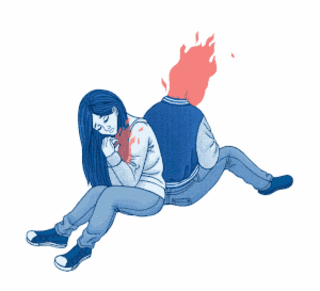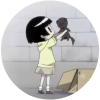@artemis
신기한 한국어를 구사하시네요 ㅋㅋ
해석하는데 지장은 없어요
맞춤법도 높은 수준이네요
@important
Welcome back!
How's the study?
Is there anything I can help?
한국어 thread: Korean chat
Re: 모두 모여 이야기~! Korean chat

그래 그때 나는 잘 몰랐었어
우린 다른 점만 닮았고
철이 들어 먼저 떨어져 버린
너와 이젠 나도 닮았네
젊은 우리, 나이테는 잘 보이지 않고
찬란한 빛에 눈이 멀어 꺼져가는데
-

Lucir - Posts: 3550
- Joined: Sun Jun 30, 2013 1:26 pm
- My pets
- My items
- My wishlist
- My gallery
- My scenes
- My dressups
- Trade with me
- @Lucir: Hello! I have a question, yes, actually! How do honourifics work? Are they the same as Japanese honourifics? Thank you in advanced!
-

important - Posts: 2576
- Joined: Tue Feb 10, 2015 11:53 am
- My pets
- My items
- My wishlist
- My gallery
- My scenes
- My dressups
- Trade with me
Re: 모두 모여 이야기~! Korean chat
Well some are different and some are similar.
For example, the meaning of "be" in English, Japanese use ~です。instead of ~だ。when it's honorific. Korean use ~입니다. instead of ~다.
私はルシアです。
私はルシアだ。
저는 루시아입니다.
나는 루시아다. (for more friendly, conversationaly 나는 루시아야)
Both language make sentence more longer when it's honorific.
But you will see the Koreans Subject is diffirent.
While Japanese honorific the noun as using お~, such as お水, お元気, Koreans don't.
There will be more but right now, this is what I can tell you.
Is that clear? c:
For example, the meaning of "be" in English, Japanese use ~です。instead of ~だ。when it's honorific. Korean use ~입니다. instead of ~다.
私はルシアです。
私はルシアだ。
저는 루시아입니다.
나는 루시아다. (for more friendly, conversationaly 나는 루시아야)
Both language make sentence more longer when it's honorific.
But you will see the Koreans Subject is diffirent.
While Japanese honorific the noun as using お~, such as お水, お元気, Koreans don't.
There will be more but right now, this is what I can tell you.
Is that clear? c:

그래 그때 나는 잘 몰랐었어
우린 다른 점만 닮았고
철이 들어 먼저 떨어져 버린
너와 이젠 나도 닮았네
젊은 우리, 나이테는 잘 보이지 않고
찬란한 빛에 눈이 멀어 꺼져가는데
-

Lucir - Posts: 3550
- Joined: Sun Jun 30, 2013 1:26 pm
- My pets
- My items
- My wishlist
- My gallery
- My scenes
- My dressups
- Trade with me
- All right, so, 다 is used as more casual, just as we use だ. Easy enough, as is the same in both languages.
Ah, I noticed you used "저" pared with "입니다"
But, "나" with "다".
Is this always the case?
So far, I have it understood, thank you!
-

important - Posts: 2576
- Joined: Tue Feb 10, 2015 11:53 am
- My pets
- My items
- My wishlist
- My gallery
- My scenes
- My dressups
- Trade with me
Re: 모두 모여 이야기~! Korean chat
And there is also ~예요 for honorify and it's softer than ~입니다.
저는 루시아예요.
No it's not absolute, just usual.
'저' is a lowering expression of '나' so the other person is indirectly honored.
It's not a worng sentence if you use 나는 ~입니다. but there is a way can be seem conceited when you are talking to someone.
It doesn't matter when you using them for just writing the expression or fact.
저는 루시아예요.
No it's not absolute, just usual.
'저' is a lowering expression of '나' so the other person is indirectly honored.
It's not a worng sentence if you use 나는 ~입니다. but there is a way can be seem conceited when you are talking to someone.
It doesn't matter when you using them for just writing the expression or fact.

그래 그때 나는 잘 몰랐었어
우린 다른 점만 닮았고
철이 들어 먼저 떨어져 버린
너와 이젠 나도 닮았네
젊은 우리, 나이테는 잘 보이지 않고
찬란한 빛에 눈이 멀어 꺼져가는데
-

Lucir - Posts: 3550
- Joined: Sun Jun 30, 2013 1:26 pm
- My pets
- My items
- My wishlist
- My gallery
- My scenes
- My dressups
- Trade with me
- All right, that makes sense. So when introducing myself to someone new, I could say
처는 이치로입니다
and when a friend, I could say,
나는 이치로다
Is this right? Saying that my name is 이치로 in Hangul (一朗)
The thing that messes me up is that there are no spaces in Japanese, but there are spaces in Korean ><
-

important - Posts: 2576
- Joined: Tue Feb 10, 2015 11:53 am
- My pets
- My items
- My wishlist
- My gallery
- My scenes
- My dressups
- Trade with me
Re: 모두 모여 이야기~! Korean chat
Yeah it's right 이치로 [いちろ]
To friend, you have to use ~야 from the second one.
나는 이치로야
~다 ends the sentence stiff. So it's usually used in writing, not in conversation.
And first one honored, 저는 이치로입니다 (Your subject is misspelled as '처')
Yeah. There is no space in Japanese.
When Korean learn Japanese, at first the book use spaces like 私は 学校に 行きます。
It might be easy when you use space meaning by meaning, and attach postpositions like は, に, へ in Japanese.
The very sentence meaning 'I go to school', it's translated as 나(私)는(は) 학교(学校)에(に) 갑니다(行きます)
To friend, you have to use ~야 from the second one.
나는 이치로야
~다 ends the sentence stiff. So it's usually used in writing, not in conversation.
And first one honored, 저는 이치로입니다 (Your subject is misspelled as '처')
Yeah. There is no space in Japanese.
When Korean learn Japanese, at first the book use spaces like 私は 学校に 行きます。
It might be easy when you use space meaning by meaning, and attach postpositions like は, に, へ in Japanese.
The very sentence meaning 'I go to school', it's translated as 나(私)는(は) 학교(学校)에(に) 갑니다(行きます)

그래 그때 나는 잘 몰랐었어
우린 다른 점만 닮았고
철이 들어 먼저 떨어져 버린
너와 이젠 나도 닮았네
젊은 우리, 나이테는 잘 보이지 않고
찬란한 빛에 눈이 멀어 꺼져가는데
-

Lucir - Posts: 3550
- Joined: Sun Jun 30, 2013 1:26 pm
- My pets
- My items
- My wishlist
- My gallery
- My scenes
- My dressups
- Trade with me
- Ah, I see.
Are there end-of-name honorifics?
For example, when calling someone, referring to someone politely, we would say: 一朗様
Does Korean have this?
Yes, as Japanese learning Korean it is difficult because I want to push everything together
-

important - Posts: 2576
- Joined: Tue Feb 10, 2015 11:53 am
- My pets
- My items
- My wishlist
- My gallery
- My scenes
- My dressups
- Trade with me
Re: 모두 모여 이야기~! Korean chat
Yes. さん refers to 씨.
Or for high honorify, 님.
Or for high honorify, 님.

그래 그때 나는 잘 몰랐었어
우린 다른 점만 닮았고
철이 들어 먼저 떨어져 버린
너와 이젠 나도 닮았네
젊은 우리, 나이테는 잘 보이지 않고
찬란한 빛에 눈이 멀어 꺼져가는데
-

Lucir - Posts: 3550
- Joined: Sun Jun 30, 2013 1:26 pm
- My pets
- My items
- My wishlist
- My gallery
- My scenes
- My dressups
- Trade with me
Re: 모두 모여 이야기~! Korean chat
If I posted something here, could someone translate it for me? ;v; It's a few photos from a hairstyling website.



• • • • • • • • • • • • • • • • • • • • • • • • • • • • • • • • •

▰ ▰ ▰ ▰ ▰ ▰ ▰ ▰ ▰ ▰ ▰ ▰ ▰ ▰ ▰ ▰ ▰ ▰ ▰ ▰ ▰ ▰ ▰ ▰

▰ ▰ ▰ ▰ ▰ ▰ ▰ ▰ ▰ ▰ ▰ ▰ ▰ ▰ ▰ ▰ ▰ ▰ ▰ ▰ ▰ ▰ ▰ ▰
█████ ███ ███ ████████████████████████
-

MacGyver - Posts: 10495
- Joined: Sat Jan 21, 2012 6:16 am
- My pets
- My items
- My wishlist
- My gallery
- My scenes
- My dressups
- Trade with me
Who is online
Users browsing this forum: No registered users and 3 guests






